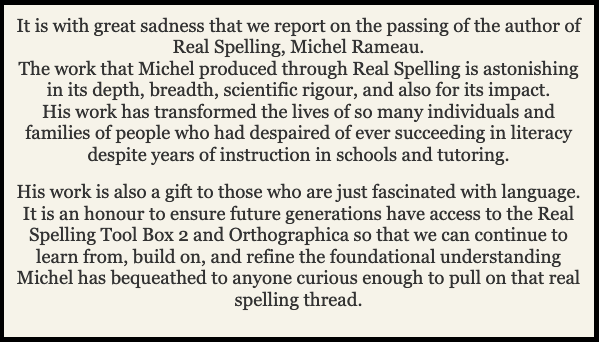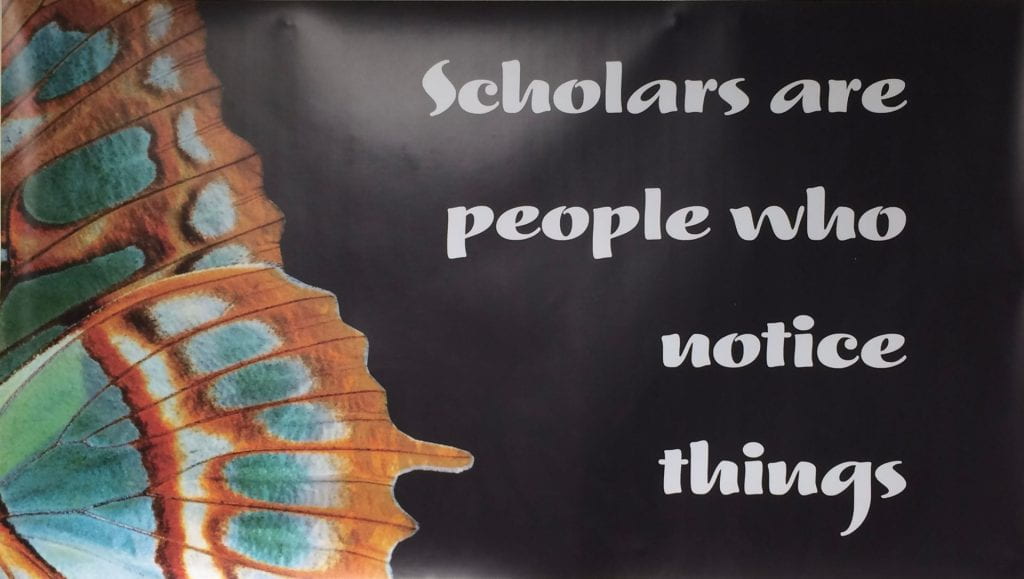The above message has been posted at the Real Spelling Tool Box 2 site. The news of Michel Rameau’s death is being received with a great sadness by those who learned from him and knew him to be an extraordinary human being. I can’t even fathom how many people have been transformed because of his work – because of him. I was first introduced to Michel by Dan Allen, whose blog caught my attention. I was especially intrigued by the matrices Dan had posted and the classroom discussions he described. When I contacted Dan to find out where to learn more, he put me in contact with Michel, who then put me in contact with Pete. I attended Pete Bowers’ workshop on Wolfe Island and then, began taking Michel’s classes. When my ignorance about English spelling surfaced, Michel was kind in his response. He didn’t need to humiliate me in order to teach me. There were no expectations about what I should or shouldn’t already know. He met me where I was and helped me understand what I didn’t understand. In fact he celebrated what he called “big, fat, juicy mistakes.”
Several times, Michel warmly accepted my request to zoom with my classroom of students. He spoke to them, not as if they were children who needed to be talked down to, but as if they were scholars deserving of an adult who would be straight with them. A few times we met to discuss Real Script. He showed them how to hold a pen so it could dance. He also showed them examples of his own glorious script. The students especially loved the sample he showed in which he had written in a circle. As you can imagine, my students and I made underlays so we, too, could try that. Other times I let the students ask their own questions about specific words or word sums they were having a hard time proving. They loved meeting with “Old Grouch.” We all learned so much from those sessions. He had a way of explaining things with simplicity, evidence, and humor. One core truth we learned was, “The question is more important than the answer. Questions are eternal. The answers are only temporary. Understanding is about questing – not about collecting answers.” Below is a picture of Michel (bald head, beard, and bow tie) with his special writing desk, his scriptorium, in the background.
Personally, I took every class he ever taught. Most of them at least twice – many of them 6+ times. He often quoted Heraclitus, who said, “No man ever steps in the same river twice, for it’s not the same river and he’s not the same man.” So true. I always walked away with something new to ponder, something better understood. I wasn’t the only person who recidivized his classes. He welcomed those returning as if we were best friends who’ve been away too long – kindred spirits who understood that learning is best accomplished in the company of others. He often reminded us that scholarship begins with three.
Being in that zoom room with Michel made me feel like I was in the highest educational setting possible. We were rigorous in our pursuits, but there was no urgency, no race-running (curriculum), and certainly no frog’s intestines cooking in a clay pot (tests). It was a space of leisure – without haste, but with deliberation. The more time I spent in classes with Michel, the more I understood the importance and effectiveness of leisure (deliberation without haste). I took this understanding into my own classroom and began to eliminate deadline requirements for student work when I could.
Students were given either individual and partner projects that extended until the student(s) was satisfied. Then the work was shared with the whole class so we could consider and discuss the information. At that point a new project began (sometimes it was chosen and sometimes it was assigned). So at any given moment, there were possibly 10-15 different projects and investigations happening. As my daily schedule permitted, I gave them at least 15 minutes and at the most 45 minutes for this work. At other times we had to hold off for a few days to attend to other tasks. But these investigations were always there to come back to. They took the time they took. The students investigated deliberately without the hustle and stress of a deadline. An added bonus to this “everyone is doing something different” was that the students became the teachers when it was time to share. There was responsibility in that.
The students enjoyed having autonomy for the pacing and the depth of their work, although they didn’t mind when guidance was offered regarding both. Once the deadline disappeared, most students used their time to check additional resources for word relatives and an etymological story. In the end they were grateful that when they asked me a question, I didn’t just answer it straight off, but rather gave it back to them for further contemplation. If I saw they were absolutely stuck, I stepped in to give the right kind of nudge so they could move forward in their investigation. They felt involved in their learning like they never felt before!
If you ever took any classes with Michel, you will recognize that I learned this from him. He would recognize our questions, but not usually answer them. Instead, he would nod and smile. It was as if he didn’t want to take away our fun at eyeing-up the evidence and figuring things out for ourselves. We learned to sit with the theories and suspicions we had but couldn’t yet prove. He delighted when one of us shared the evidence we had collected after posing a question. He urged us to also share in the Sunday Band of Scholars so that others might contemplate our questions and give us more to consider.
The other reason Michel didn’t necessarily reply to our questions with an answer is that he never wanted to be that “expert dispensing knowledge.” He wanted us more involved in the thinking, the identification of what it is we didn’t know, the questioning, and the considering of evidence. Have you ever noticed that oftentimes, when given an answer, people tend to stop asking questions about that particular topic? He didn’t want that because as he said numerous times, “Questions are eternal. Answers are temporary.” Inspired by this idea, I wrote the following on my whiteboard and kept it up all year.
These are just a few ways in which my teaching was influenced by what I learned from Michel. I haven’t even mentioned the information I learned and then taught regarding his Latin and Greek for Orthographers classes! My students thought it was so cool to learn about twin bases, biliteral bases, and uniliteral bases! One year my students gifted Michel with a video of them singing the Greek alphabet. I can still hear his delighted reaction to it!
And then there was the way he welcomed us into his personal life. He found perfect moments in his films for sharing his favorite music or his favorite lyrics. He specifically shared those things about language that delighted him so that we, too, could be delighted. His bookshelves housed special editions of books he handled reverently when showing them to us. I also recall the personal stories he shared of his family and especially of his partner, Pascal.
His body of work is something I will continue to learn from. The Real Spelling Tool Box 2 is incredible. Unless you’ve had a good look at one of its themes, it is hard to imagine the amount of information that is waiting for you. It is a resource to be visited and revisited. His gallery of films is another treasure trove. There’s just always something to learn! And of course, the films at Orthographica need to be mentioned as well. These are the films Michel showed in his classes – the very same classes that so many recidivised. He revealed the connections between Greek and Latin spelling and Present Day English spelling. Fascinating! I was constantly in awe at all that he knew. What an learned gentleman! I am so unbelievably grateful for having known Michel and for having learned from him.
If you’d like to share either a memory or a favorite quote you heard him say, please do so!




